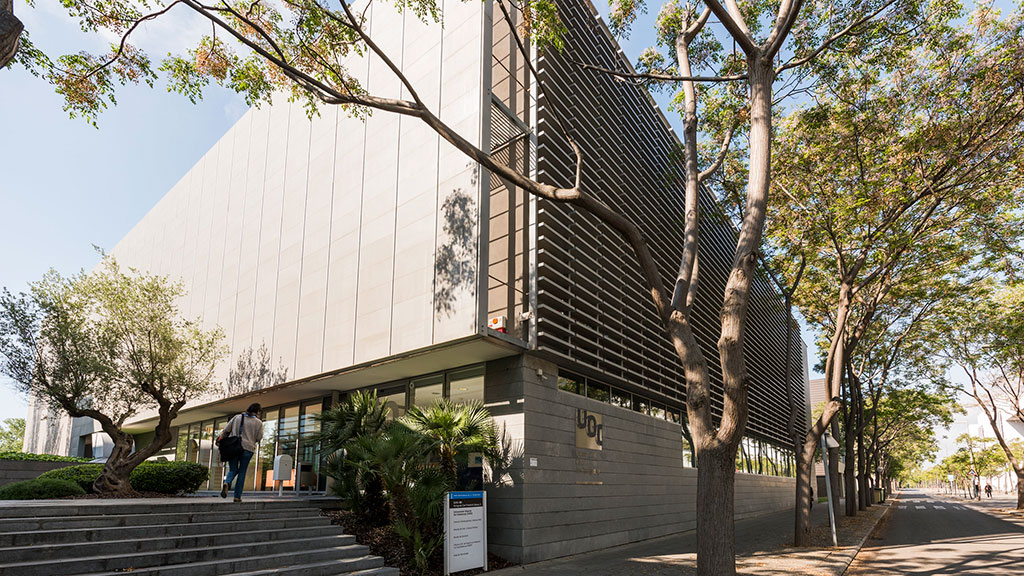UOC and Castelldefels Municipal Council join forces to promote knowledge transfer
The UOC has signed an agreement with the Municipal Council to strengthen ties between the University and the town's local business community
The Universitat Oberta de Catalunya (UOC) has signed a collaborative agreement with Castelldefels Municipal Council to promote synergies between its research and innovation initiatives and the local business network. The two institutions are committed to fostering the development of technological solutions with companies and entrepreneurs, as well as the promotion of Castelldefels as an innovative business ecosystem. The agreement – initially for a period of four years, with an option to extend for a further four – was signed by UOC President Josep A. Planell and mayor of Castelldefels, Maria Miranda.
The initiative reflects the University's desire to establish partnerships that promote experience exchanges that foster professional development and boost the competitiveness of the knowledge society. The agreement signed by the UOC and the Municipal Council also states that the two entities are committed to pursuing other complementary objectives with regard to research, teaching and technological development and have an interest in implementing activities aimed at fostering and increasing mutual benefits.
The agreement aims to promote the UOC as an engine for local economic development in Castelldefels, providing solutions tailored to its technological innovation needs. One of the University's centres is in fact based in the town's Mediterranean Technology Park (PMT). In relation to research and innovation, the centre houses the UOC's Interdisciplinary Internet Institute (IN3), UOC R&I and its Doctoral School.
A joint effort to promote research
The University and Municipal Council are committed to the promotion of a production model based on knowledge and technology. As an illustration, the two institutions are working to increase their involvement in the development of research projects, as well as to promote the hiring of industrial doctoral students – those carrying out their doctoral thesis research within companies – within the local business area. The UOC and local authority have also agreed to pool resources regarding the use of equipment and the exchange and training of technical, research and expert staff, in addition to joining forces to promote innovation platforms and conferences to link research and the productive sector.
Collaboration
One of the UOC's first research and innovation collaborations with Castelldefels Municipal Council involved the creation of augmented and virtual reality exhibition materials for the Cova del Rinoceront (Rhinoceros Cave) archaeological exhibition. These immersive technology projects were generated by the UOC spin-off Immersium Studio, which developed audiovisual products to showcase the excavation work carried out by the researchers, thereby enabling the animals found to be recreated and exhibited. Immersium Studio is based in the Research, Development and Technological Innovation (RDIT) building set up inside the Castelldefels Technology Park as an incubator for technology companies.
Strategic plan
Castelldefels Municipal Council will manage this programme through its Economic and Employment Promotion Department, with the UOC's Knowledge Transfer & Entrepreneurship unit at UOC R&I acting on behalf of the University. This unit is responsible for coordinating the University's strategic plan for knowledge transfer, which provides the framework for the collaboration signed with Castelldefels. Approved by the Government of Catalonia, the UOC's Knowledge Transfer and Value Creation Strategic Plan (PETER) came into effect in 2016 with a budget of more than €1.5 million, half of which is funded by the European Regional Development Fund (ERDF) and half by the University. PETER consists of five core areas of activity for completion by 2021: to foster collaboration with the local business community and target R&I activities to respond to the needs of society; to emphasize the value and market the results of research and innovation in order to generate economic and social impact; to foster entrepreneurship within society; to promote a culture for the transfer and diffusion of R&I results; and to work towards the ongoing improvement of the UOC's Knowledge Transfer & Entrepreneurship unit as a benchmark for quality.
UOC R&I
The UOC's research and innovation (R&I) are helping 21st-century global societies to overcome pressing challenges by studying the interactions between ICT and human activity, with a specific focus on e-learning and e-health. Over 400 researchers and 48 research groups work among the University's seven faculties and three research centres: the Internet Interdisciplinary Institute (IN3), the eLearn Center (eLC) and the eHealth Center (eHC).
The United Nations' 2030 Agenda for Sustainable Development and open knowledge serve as strategic pillars for the UOC's teaching, research and innovation. More information: research.uoc.edu.


Press contact
-
Editorial department
